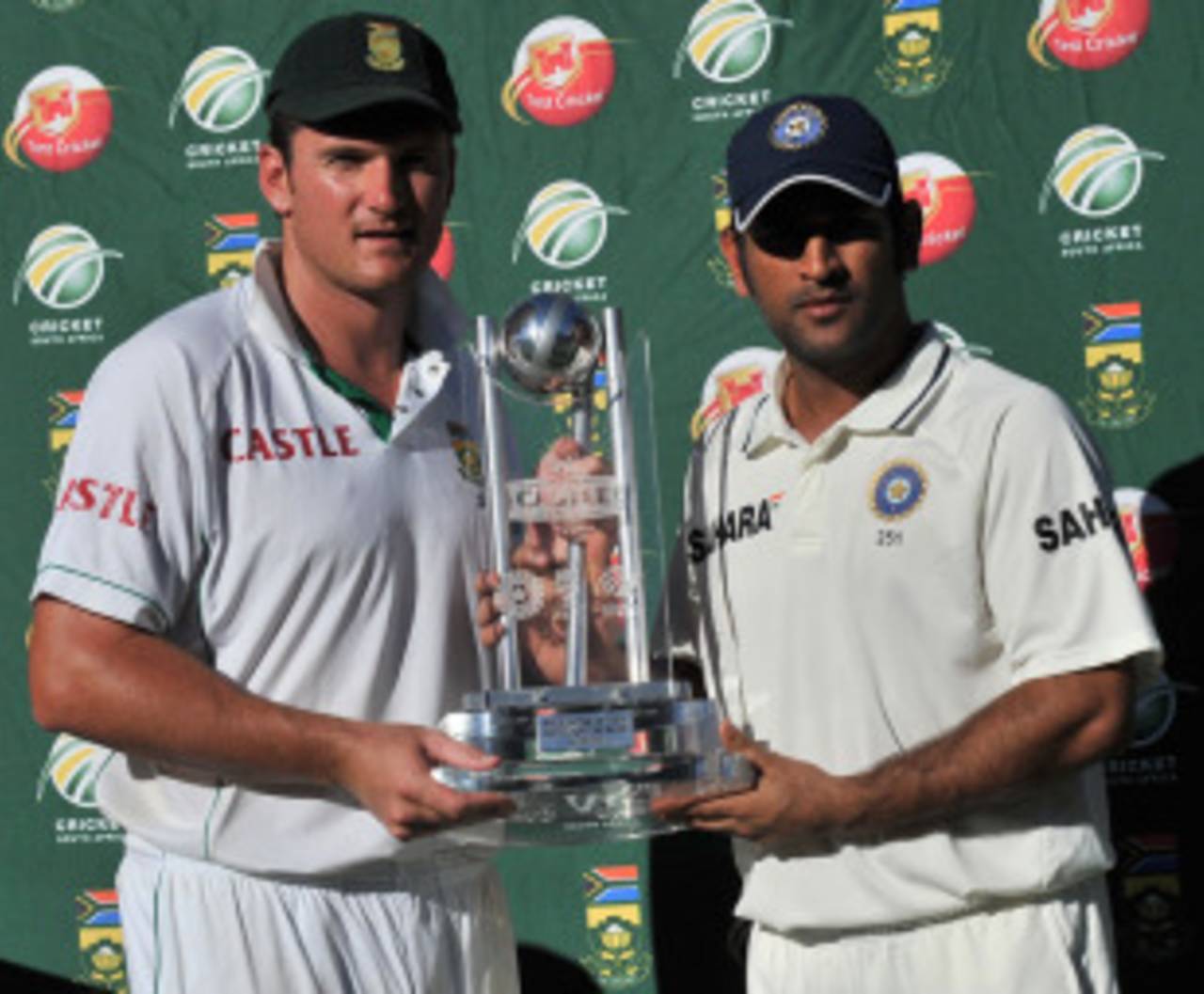As the sun began to disappear behind Table Mountain and the curtain began to fall on the fourth day of the deciding Test between South Africa and India, one question hovered over Newlands: When would South Africa declare? When they reached 270 and still had about 100 overs to bowl India out? When Jacques Kallis reached his second hundred of the match? When the lead had swelled to 300? The answer ended up being never, because South Africa waited to be bowled out for 341, setting India a target that, if reached, would have been a record at Newlands.
Like a child reaching for its security blanket in times of anxiety, South Africa wanted to be in as comfortable a position as they could. Their first priority was not to lose the series. That might have been anyone's reaction, when at 130 for 6, it looked as though defeat, albeit to the world's number one Test side, was imminent. "We really had our backs to the wall then," Graeme Smith said, which may have explained why they didn't want to stop building their wall of resistance until the bricks had run out.
It was sensible in that it guaranteed two results, a South Africa win or a draw because India had been set a total that they would not be interested in chasing. In terms of a safety net, it was a good one, but in terms of applying the principles of an aggressive mindset, something team psychologist Dr Henning Gericke swears by, it was flawed. Gericke told ESPNCricinfo before the Test that South Africa had to learn to "take more risks and not be afraid to try things." Dangling a carrot like a target of 280 in front of India would have been a gamble but it would have sporting. It would have showed intent and positivity and it would have made for a more testing end to what's been an enthralling series.
The statistics were all in South Africa's favour. A team had only chased more than 300 once at Newlands. Not any team, but Australia at the height of their powers in 2002. South Africa have only failed to defend a target over 250 at home under Smith once (against Australia in Johannesburg in 2006) and India are historically poor chasers.
Still, something in Smith's mind wanted safety above all else. At the post match press conference he gave a little insight into what that might have been. "You are looking for your spinner to contribute more and more as the game goes on," Smith said, "Harbhajan did it for them yesterday," Paul Harris battled to be effective on the Newlands pitch, because, despite the bounce, he would only be able to find turn in the rough, and for that he would have needed to be a different bowler as Harbhajan himself said after day four. "I don't think he will have an impact. He would have to be a right arm-offspinner to find the rough."
Harris has proved himself invaluable in containing roles, he often gets key wickets during crucial passages of play, but he is self-admittedly not an attacking spin bowler. His value for the team comes in other areas, for example, he only gave away 29 runs in his 30 overs on the final day and he is part of the brains trust of the team, but he is not a bowler who is known for being aggressive. South Africa have been happy with a containing spinner in their side but have shown signs of wanting a more attacking one, and with Imran Tahir becoming eligible to play for them, they may have found one. This Test match highlighted why, at times, they will need one.
For large portions of the day's play, South Africa had five men around the bat and set attacking fields. It wasn't enough to bag them wickets because, besides being one bowler short, there was little support for Dale Steyn. Morne Morkel, who was exceptional in Centurion, has been inconsistent since then, and Lonwabo Tsotsobe was unlucky, as catches were dropped off his bowling in all three Tests. While Tsotsobe did manage a few important scalps, his name is still not glued to the position of third seamer.
While the series highlighted more about the bowling than it did about the batting, the aspect of South Africa's game it really put under a microscope was the mental one. South Africa are a team that can perform superbly to plans, as they showed in Centurion. They panic when things get beyond their control as they did in Durban, and they have not yet reached the point where they are willing to play the brand of brave cricket to which they once claimed to be dedicated. That courage is not the type that sees Jacques Kallis bat for hours with a pain in his rib that made him feel like he had been "stabbed" in that area, it's not the type that sees Smith walk out to bat with a broken hand, it's not the type that overcomes physical pain at all. It's the courage to overcome a mental hurdle, the one that says "we need to be safe" and to take a chance on the unknown.
Firdose Moonda is ESPNcricinfo's South Africa correspondent
